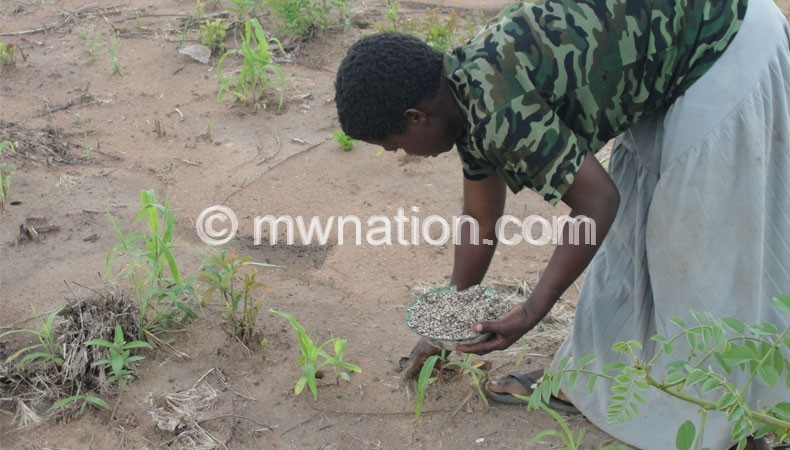Malawi fertiliser imports double

Fertiliser imports more than doubled between 2012 and last year, rising by about 75 percent to K125.4 billion in 2013, and dominated Malawi’s total imports.
Available figures indicate that in 2012, agro-based Malawi imported fertiliser valued at about K71.7 billion compared to about K29.2 billion the previous year.
Relative to other imports, Malawi’s fertiliser imports accounted for about 12 percent of the country’s total imports of K1.03 trillion, an indication that the country requires more of the farm inputs.
But regardless of the ready demand for fertiliser, Malawi produces a small amount of the inputs and a commentator has said local production of fertilisers would greatly benefit the country.
Speaking in a telephone interview on Thursday, Civil Society Agriculture Network (Cisanet) national coordinator Tamani Nkhono-Mvula in a telephone interview said in the long run it is cheaper to invest in fertiliser manufacturing plant than to import.
“Bearing in the demand for fertiliser the government would have saved in the long run if the money that the country has used in Farm Input Subsidy (Fisp) which the country has been implementing for the past eight years was used for investing in a fertiliser making plant. Investing in local production will cut transportation costs and will ensure that farmers have access to the inputs,” said Nkhono-Mvula.
He added that it makes more economic sense to import raw materials than finished fertilizer because some of the raw materials are produced by Malawi’s neighbours.
In 2004, Coin Chemical Group, a Taiwanese company announced plans to establish a fertiliser manufacturing company which would produce at least 30 000 metric tonnes, about one fifth of the country’s demand. However, the investment did not materialise after Malawi cut ties with Taiwan.
Presiding over the ground breaking ceremony in July 2005, former president late Bingu wa Mutharika was quoted in The Nation having said that the country would benefit more from producing the fertiliser locally than importing because agriculture production would increase ensuring food security, job creation savings on the much needed foreign exchange.
The then Minister of Industry and Trade Martin Kansichi, speaking during the ground breaking ceremony as quoted by The Nation, said the setting up of the factory would reduce fertiliser prices and hence become affordable to farmers who could in turn produce enough food to ensure food security.
Apart from fertilisers Malawi’s other major imports in 2013 included diesel and other fuels at K95 billion, pharmaceutical products at K79.1 billion, petroleum, paraffin and coal.
The government in the annual economic report has indicated that fertiliser, diesel and other fuels, pharmaceutical products and petroleum continue to dominate the country’s imports most often constituting to over 90 percent of all imports.





Somehow this is confusing, actually the fertiliser imports have not doubled at all. Its the MK value of the imports that has doubled and mostly due to FISP, which buys fertiliser at greatly inflated prices. This is the result of buying from local companies who get these contracts through underhand strategies. The prices qouted for fertiliser in Malawi start from US$700/metric tonne (CIF Indian Ocean ports), while most of these fertilisers can be produced right here in Malawi for US$490/tonne. The cost of bringing these fertilisers from Beira, Nacala and Dar are also not less than US$90/tonne. So you can see what the nation is losing out. The country actually needs in excess of 450,000 tonnes annually for the rainy season, but wemake do with 250,000 tonnes only.
The woman in the photo appears to be applying the wrong fertiliser for the stage of crop. I think that looks like a basal application, i.e. NPK or something like that. At the three to five leaf stage she should be applying the likes of AN or CAN which is usually white in colour. So if I am right, then I guess there is so much more work beyond availing the fertiliser. Effective use is very critical for positive results!!